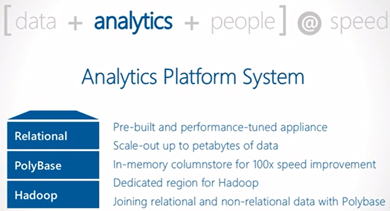News
Microsoft Ramps Up Big Data Efforts with Two New Products
- By David Ramel
- April 16, 2014
Microsoft on Tuesday announced two new data platform products: the Microsoft Azure Intelligent Systems Service (ISS) and the Analytics Platform System (APS).
CEO Satya Nadella introduced the products at an event in San Francisco, where he emphasized the importance of data in today's world of ubiquitous computing and ambient intelligence. The ISS embraces the "Internet of Things" for data analytics, while the APS allows queries across traditional SQL data warehouses and Hadoop stores.
Microsoft's aim is to provide the "magic" to bridge the technology gap between huge amounts of data -- the "data exhaust" generated from ubiquitous computing -- and the ambient intelligence derived from that data that can improve business, Nadella said. To that end, the ISS helps users embrace the Internet of Things by securely connecting to machine-generated data from sources such as devices and sensors, capturing that data and managing it to derive business value, regardless of the OS being used. Microsoft said the service lets users analyze the data with familiar tools such as HDInsight and Power BI for Office 365. The company said the service is available out of the box to take advantage of the Internet of Things and immediately generate business value by exposing actionable insights from the data collected by any devices in an organization.
"This makes it possible for you now to be able to collect data from all the sensors and servers, bring that into cloud, so you can take advantage of the rest of the data platform to be able to do the analysis, the machine learning," Nadella said. "And so that is a service that I think will take out all the friction that exists in being able to connect the cloud to the Internet of Things trend that is only going to increase."
Users can request to take part in the limited preview of the service.
The other new product, the APS, is now generally available. Microsoft described the product as an "evolution of the Parallel Data Warehouse" with the new capability to query across data stored in a traditional relational data warehouse and also data stored in a Hadoop region, either in an on-premises turnkey appliance or in a separate Hadoop cluster.
 The new Analytics Platform System.
The new Analytics Platform System.
Nadella noted that central to this new "Big Data in a box" technology is the PolyBase project developed from research done by David DeWitt and his team.
APS, Nadella said, "for the very first time brings together the Parallel Data Warehouse of SQL with a Hadoop region. So that means now you have the ability in one affordable appliance to do queries across both of these. You can imagine the scenarios. You can imagine having data from your transaction systems, your log information from your servers and Web sites, as well as social streams and the ability now to be able to query across all of this."
Quentin Clark, corporate vice president of the Data Platform Group, also presented at the event and wrote an accompanying blog post about APS, in which he stated, "SQL Server has seamless integration with VMs in Azure to provide secondaries for high availability and disaster recovery. The data people access in the business intelligence experience comes through Excel from their own data and partner data -- and Power BI provides accessibility to wherever the data resides."
The Microsoft team also expounded on the new capabilities of SQL Server 2014, which recently became generally available. The product's primary new capability is in-memory technology, which can provide enormous and instantaneous performance benefits.
Microsoft's Julie Strauss joined Clark to walk through a scenario involving a fictional e-commerce company called Fabrikam. The regular sales Web site suffered some performance problems, taking about seven seconds to load a user's recommendations as derived from behavior. With just a few keystrokes, Strauss applied in-memory optimization to the underlying SQL Server 2014 table and reported a sevenfold increase in performance, bringing the recommendations up in about one second. She also memory-optimized tables to gain a 23x performance boost in concurrent purchases and a 71x gain the time needed to update the best-seller list.
 [Click on image for larger view.]
In-memory e-commerce Web site performance optimization.
[Click on image for larger view.]
In-memory e-commerce Web site performance optimization.
Clark said in-memory transaction processing optimization resulting in general 30x performance gains in throughput and latency is now available for every workload running in SQL Server 2014, the first RDBMS product to have that capability.
"In-memory technology has been allowing users to manipulate millions of records at the speed of thought, and scaling analytics solutions to billions of records in SQL Server Analysis Services," Clark wrote in his blog.
Throughout his address, Nadella emphasized a "data culture" at Microsoft, which allows insights to come from anyone, anywhere, at any time, as long as they have the right tools to work with. Fostering that data culture in other organizations lets employees do great things, he said, and embodying this data culture is of extreme importance at the company, even going so far as to say it's "the most paramount thing inside of Microsoft."
This data culture, in which every engineer is leveraging usage data to test and improve products, is "the lifeblood of Microsoft," Nadella said. "In every aspect, you have to build deeply into the fabric of the company a culture that thrives on data," he said.
Nadella also wrote a blog post about his address, in which he concluded, "We are all experiencing the explosion of data driven by ubiquitous computing. We all crave easier and faster ways to turn that data into fuel for insight, and to realize the potential of ambient intelligence for every individual and every organization. Today marks a big step toward, and we're going to keep moving quickly."